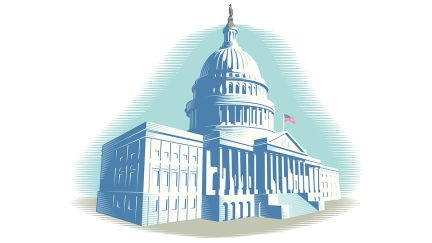For more stories like this, sign up for the PLANADVISERdash daily newsletter.
Fed Raises Rates Again, But How Can Investors Hedge Against Inflation?
Wharton School Professor Emeritus Jeremy Siegel spoke out against Fed rate hikes and laid out potential investor responses.

Jeremy Siegel, professor emeritus of finance at the Wharton School of the University of Pennsylvania, who spoke Wednesday at a conference hosted by the CFA Institute about one hour before the Federal Reserve Open Market Committee announced its decision to again raise interest rates, expressed sharp disapproval of Chairman Jerome Powell’s leadership.
The Fed raised the federal funds rate by another 25 basis points and reiterated its commitment to reducing inflation to 2%. The decision was unanimous and is the 10th such raise since March 2022.
Siegel said the Fed has already raised rates too high and that he thinks the latest hike is also regrettable: “The Fed is tightening way too much, given that inflation has come down.”
Although he said he expects Wednesday’s to be the last rate increase, the series of rate hikes is not justified by admittedly high inflation and will likely lead to a mild recession, according to the Wharton professor emeritus. When Siegel said, “I am not thrilled with Chairman Powell,” he drew applause from the CFA audience.
Siegel then pivoted to what investors can do while dealing with high inflation and the Fed’s monetary policy. Above all else, Siegel emphasized the superiority of stocks as a long-term investment.
“Stocks are the perfect hedge against inflation,” Siegel explained. Stocks have consistently outperformed bonds, gold and other assets over a long time horizon, he said.
Despite Siegel’s confidence, the major stock indexes were largely down between 0.50% and 0.80% following the Fed’s announcement.
Siegel later acknowledged that equity real estate investment trusts and some high-yield bonds can come close to stocks in terms of long-term returns and said the only bonds he has ever invested in for the long term came in a high-yield junk bond fund managed by Vanguard, though he did not specify the precise fund.
As a final thought, Siegel shared his views on the ongoing standoff over the federal debt ceiling. He said “there will not be a default on the debt” and compared it to a “game of chicken.” Though when playing chicken, it is not unheard of for the cars to smash together if neither swerves out of the way.
Perhaps a bit nihilistically, Siegel also said that if the federal government comes close to a default, it will be “a good time to buy” stocks and treasuries especially, since other investors will be selling in anticipation of a crisis that ultimately does not take place.
You Might Also Like:

Social Security Raises Benefit by 2.5% for 2025

Rate Cuts Changing DC Investing Landscape




